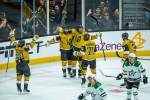Realtors adjust to times

Raising two teenage daughters in Las Vegas is tough enough. Throw in 60-hour work weeks and a 50 percent reduction in income, and life for the husband-and-wife Realtor team of Joe and Linda Stewart has become a lot more stressful in the last couple of years.
They’ve had to trim salaries and staff at their Realty Executives office, cut direct-mail postage costs, advertise less in glossy home magazines and do more virtual tours on the Internet.
“We’re kind of back to where we were in 1995 when it was just the two of us and we had our first child,” Linda Stewart said while showing a short-sale home in Summerlin. “Nobody was helping us in the office. So now I’m doing what four people were doing. We go home and collapse.”
It’s all part of the adjustments Las Vegas real estate agents have made as home sales fell from more than 64,000 in 2004 to 45,000 last year and median prices dropped from $290,000 to $123,000.
At 6 percent commission, typically split between buyer and seller agents, that’s a loss of $781.5 million in commission, enough to force about 5,000 Realtors to give up their licenses and thousands of others to take part-time jobs to supplement their income.
“It definitely has an affect on our ability to sustain each day because we rely on each of those sales to make our share to help us run our business,” said Devin Reiss, broker and owner of Realty 500 Reiss Corp. and former president of the Greater Las Vegas Association of Realtors.
“If sales are down, we’ve got fewer dollars coming into the company,” he said. “Couple that with prices coming down and less of a margin on the sales you do have.”
Reiss has gone from hanging 85 real estate licenses in his office to about 50. This has helped reduce expenses associated with independent contractors, as most Realtors are categorized.
Christopher Rauschnot was a Realtor with Rise Realty, marketing arm for the Pinnacle high-rise luxury condominium project once proposed on Tropicana Avenue. He gave up the designation and went back to being a sales associate when the market soured.
“It’s too expensive for fees every quarter,” he said. “I tried to do a couple short sales and the banks never got back to me. I couldn’t perform for my clients. There just wasn’t any business for me.”
The average real estate agent does six or seven “sides” a year, representing either the seller or buyer, at about $4,000 gross commission for each closing, Joe Stewart said.
“So you’d better have a different job because there are 12,000 agents and maybe 500 or 1,000 are making it along and the others are not,” he said.
The plunge in home prices has cut gross commissions back to where they were 30 years ago, broker Frank Nason of Residential Resources said.
Commissions are not set in stone, but the 3 percent split for each agent is most common, he said. They may be lower for listing agents of real estate-owned properties, or foreclosures, because of the high transaction volume, and short-sale commissions frequently get adjusted downward for both parties.
“I know a lot of offices and agents charge additional fees over and above what the commissions produce, what are called transaction fees,” Nason said. “I’ve seen some as high as $795 extra to a buyer, but more frequently they are in the $300 to $400 range. I don’t charge any of those fees and actually pay for the buyer’s home warranty that typically runs $300 to $350 as part of my services.”
Along with receiving less in commissions, real estate agents are working harder on short sales and foreclosures, which account for about 70 percent of home sales in Las Vegas. Short sales, or sales for less than the balance owed, require lender approval and can take four to six months, though Realtors are reporting some progress in shortening the process.
“You work three times as hard for one-fourth the income,” Susan Rubin-Yehros of Royalty Realty Las Vegas said. “You really have to hustle and you always have to be accommodating, more so today. If someone calls at 8 o’clock at night, you’ve got to be very patient, very considerate. People are hurting. You understand their pain and there’s only so much you can do.”
Realtors need to be diversified and flexible, Steve Hawks of Platinum Real Estate Professionals said. He’s doing short sales in California and Las Vegas, working with investors at trustee sales and helping buyers find homes that are reasonably priced.
“Everybody in Vegas, I think, has taken a pay cut in some form or another,” Hawks said. “Prices are down 50 percent to 60 percent. Unfortunately, our expenses are not.”
While prices have retreated to late-1990s levels, the bigger challenge is inventory, he said. The real estate market is depressed because banks are holding back available inventory.
New-home sales picked up a few months ago when REO inventory diminished and homebuyers were willing to pay a premium to get the tax credit. Now buyers are back to looking for bargains in short sales and foreclosures, a perfect example of how a government program “changes the rules overnight,” Hawks said.
People see stories about the real estate market in Las Vegas and think there’s a fire sale, but that’s not reality, Rubin-Yehros said.
“Everybody has a bottom line and sometimes you have to educate them,” she said. “I tell people we’ve never had a market like this. It’s a learning experience for all of us.”
Nason finds it ironic that he had a difficult time when he started in real estate in 1979 because interest rates were “soaring through the roof” and he had no referral business. Now he gets 80 percent of his business from referrals and interest rates are at historic lows.
“So because my overhead in Las Vegas is quite low I’m doing OK,” he said, “though others in my office who got used to the bubble income are having a more difficult time adjusting.
“I don’t know anyone who works for a limited-service company like Help-U-Sell,” Nason said. “But I bet they are taking some lumps as the fixed fees they used to charge would be higher than a typical commission.”
Luxury high-rise specialist June Stark said she was doing well until June, when the market turned sluggish.
“I don’t know if it’s the oil spill, the horrible state of the economy or the fear of a double-dip recession,” Stark said. “It just got really slow.”
Contact reporter Hubble Smith at hsmith@reviewjournal.com or 702-383-0491.


















